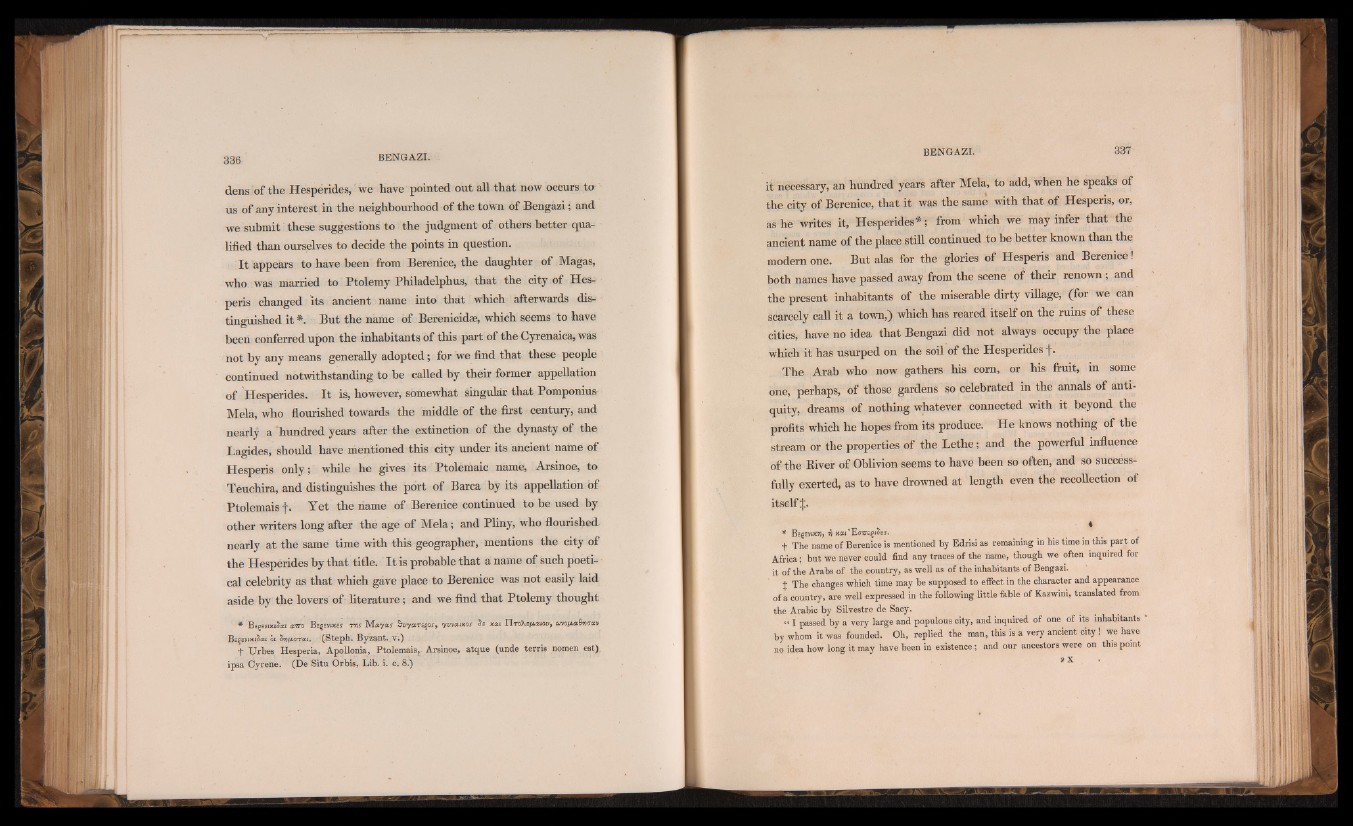
dens of the Hesperides, we have pointed out all that now occurs to
us of any interest in the neighbourhood of the town of Bengazi; and
we submit these suggestions to the judgment of others better qualified
than ourselves to decide the points in question.
I t appears to have been from Berenice, the daughter of Magas,
who was married to Ptolemy Philadelphus, that the city of Hes-
peris changed its ancient name into that which afterwards distinguished
it*. But the name of Berenicidae, which seems to have
been conferred upon the inhabitants of this part of the Lyrenaica, was
not by any means generally adopted; fcjr we find that these people
continued notwithstanding to be called by their former appellation
of Hesperides. I t is, however, somewhat singular that Pomponius
Mela, who flourished towards the middle of the first century* and
nearly a hundred years after the extinction of the dynasty of the
Lagides, should have mentioned this city under its ancient name of
Hesperis only; while he gives its Ptolemaic name, Arsinoe, to
Teuchira, and distinguishes the port of Barca by its appellation of
Ptolemaisf. Yet the name of Berenice continued to be used by
other writers long after the age of Mela; and Pliny, who flourished
nearly at the same time with this geographer, mentions the city of
the Hesperides by that title. I t is probable that a name of such poetical
celebrity as that which gave place to Berenice was not easily laid
aside by the lovers of literature; and we find that Ptolemy thought
* BcgEViXiJai alto Bsgsvixsr m s M a y a s SuyaTtqoSj ywa.ix.os Se xai IlToXg/xaioy, coyo[xa9ntrav
Bsgsvtxi&ai 01 Sn/xorai. (Steph. Byzant. ,yi) .
•f* Urbes Hesperia, Apollonia, Ptolemais, Arsinoe, atque (unde terris nomen est).
ipsa Cyrene. (De Situ Orbis, Lib. i. c. 8.)
it necessary, an hundred years after Mela, to add, when he speaks of
the city of Berenice, that it was the same with that of Hesperis, or,
as he writes it, Hesperides*; from which we may infer that the
ancient name of the place still continued to be better known than the
modern one. But alas for the glories of Hesperis and Berenice!
both names have passed away from the scene of their renown ; and
the present inhabitants of the miserable dirty village, (for we can
scarcely call it a town,) which has reared itself on the ruins of these
cities, have no idea that Bengazi did not always occupy the place
which it has usurped on the soil of the Hesperides f.
The Arab who now gathers his com, or his fruit, in some
one, perhaps, of those gardens so celebrated in the annals of antiquity,
dreams of nothing whatever connected with it beyond the
profits which he hopes from its produce. He knows nothing of the
stream or the properties of the Lethe; and the powerful influence
of the Biver of Oblivion seems to have been so often, and so successfully
exerted, as to have drowned at length even the recollection of
itself
4
* BsgEvtX»), x«i'E<J7rs§icies‘.
t The name of Berenice is mentioned by Edrisi as remaining in his time in this part of
Africa; but we never could find any traces of the name, though we often inquired for
it of the Arabs of the country, as well as of the inhabitants of Bengazi.
The changes which time may be supposed to effect in the character and appearance
of a country, are well expressed in the following little fable of Kazwini, translated from
the Arabic by Silvestre de Sacy.
“ I passed by a very large and populous city, and inquired of one of its inhabitants *
by whom it was founded. Oh, replied the man, this is a very ancient city! we have
no idea how long it may have been in existence ; and our ancestors were on this point